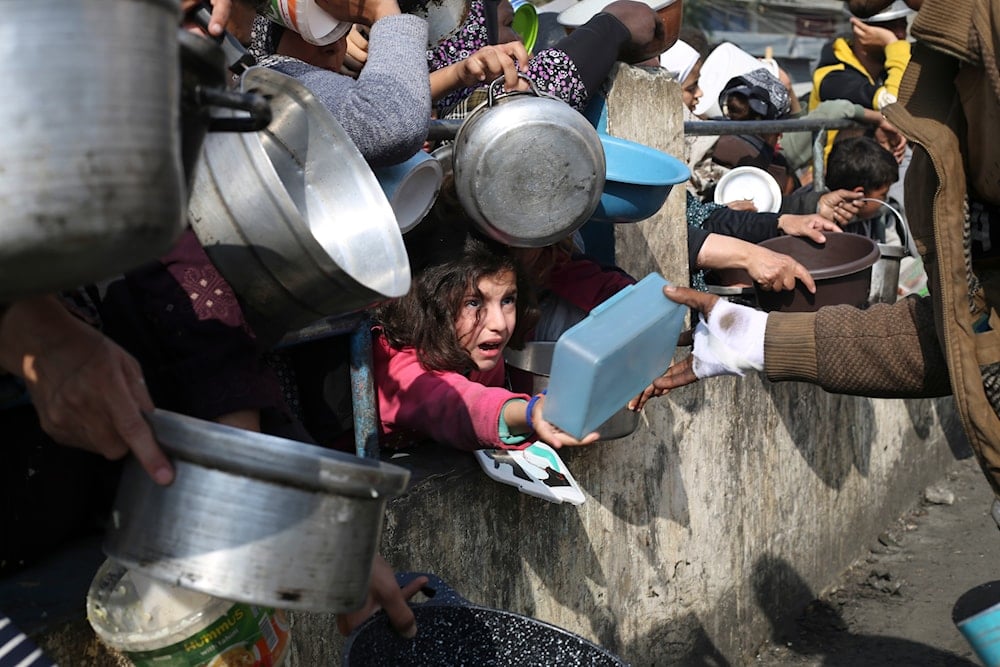Gaza Humanitarian Foundation failed its aid mission, UN rules
The UN says the Israeli-backed Gaza Humanitarian Foundation has failed to meet humanitarian standards, citing unsafe aid access and severe communication blackouts.
-

Palestinians line up for food during the ongoing Israeli genocidal war and systematic famine policy on the Gaza Strip in Rafah, occupied Palestine, Tuesday, Jan. 9, 2024 (AP)
The United Nations has condemned the Gaza Humanitarian Foundation (GHF), a US and Israeli-backed initiative, declaring it a failure from a humanitarian standpoint and accusing it of failing to meet basic standards of neutral and safe aid delivery in Gaza.
Speaking at a press briefing in Geneva, Jens Laerke, spokesperson for the UN’s Office for the Coordination of Humanitarian Affairs (OCHA), criticized the foundation’s operations, stating, “GHF, I think it's fair to say, has been, from a principled humanitarian standpoint, a failure.”
Laerke explained that GHF had not adhered to fundamental humanitarian principles, particularly in ensuring safe access to civilians in need across the Gaza Strip.
“They are not doing what a humanitarian operation should do, which is providing aid to people where they are, in a safe and secure manner,” he said.
Laerke stressed that UN agencies had aid stockpiles ready for delivery in the region and pre-cleared by “Israel”, but border closures and the absence of basic law and order inside Gaza continue to block distribution efforts.
“We need the borders open to get in and of course we need the safety and security and some resemblance of law and order inside Gaza in order to distribute it,” he said.
Communication blackout cripples humanitarian coordination
Adding to the challenges facing humanitarian operations, Laerke confirmed that the last remaining fibre optic cable in Gaza had been damaged in a recent attack, plunging the territory into a total communications blackout.
The Palestinian Authority blamed the Israeli regime for the attack and reported the complete loss of internet and landline connectivity across the Strip on Thursday.
“There was and there still is a massive comms blackout,” Laerke noted, warning that such conditions seriously impair the ability of aid agencies to operate.
“If there is no communication it really is damaging” for aid services, he said.
Efforts were underway to restore connectivity, but Laerke emphasized that “things kind of ground to a halt” in the absence of reliable communications.
GHF operations face growing backlash
The Gaza Humanitarian Foundation was launched on May 26, more than two months after the Israeli occupation cut off all aid and commercial deliveries to the Gaza Strip, triggering warnings of mass famine.
Though officially presented as a private initiative, GHF is widely seen as being under Israeli and US influence. Its lack of transparency and close coordination with Israeli military planning has drawn rejection from key humanitarian actors, including the United Nations and major international aid organizations.
Despite claiming to have delivered over 18.6 million meals, including 2.6 million on Thursday alone, the GHF has failed to gain legitimacy in the eyes of the broader humanitarian community.
Laerke reiterated that aid must be delivered based on humanitarian need, not political objectives or military strategies.
As the Gaza humanitarian crisis deepens, the UN has urged immediate access to the enclave, warning that without a fundamental shift in approach, the situation will continue to deteriorate under the shadow of siege, violence, and political interference.

 3 Min Read
3 Min Read










